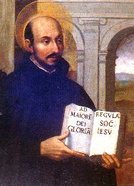
To make himself of greater use for the profit of souls, he determined to improve himself by education, beginning by going through the rudiments among little boys. He left nothing untried that could help towards the salvation of others, and it was marvellous what pain and mockery he cheerfully accepted on all hands, suffering ill-usage also, imprisonment and stripes almost unto death; but he was willing to suffer them all much more for the greater glory of his Master. At Paris he took to him seven comrades from the members of that University, men of different nations, but who had all taken the Degree of Master of Arts and in Divinity. With these seven he laid the first foundations of the Society of Jesus in the crypt of Montmartre. When he afterwards organised the same Society at Rome he bound it by the closest bonds to the Apostolic See, adding to the three accustomed vows of Poverty, Chastity, and Obedience, a fourth, concerning Missions. Paul III was the first Pope to receive and confirm the Institute, but it hath since been approved by other Popes and by the Council of Trent. Ignatius, to spread the Faith, sent holy Francis Xavier to preach the Gospel in the Indies, and others in other parts of the world, and the war, which he thus proclaimed against paganism and heresy, was waged with such success, that it was the general belief, confirmed by the utterance of the Pope, that even as God had in other times raised up holy men specially to meet the needs of their day, so he had raised up against Luther and the heretics of that age, Ignatius and the Society which he had founded.
But the first care of Ignatius was to set forward godliness among Catholics. He was a great promoter of seemliness in the Churches, instruction of the Catechism, and often hearing Sermons and using the Sacraments. He opened schools everywhere to train up boys in godliness and good learning. At Rome he founded the German College, a home for fallen and another for imperilled girls, an orphanage for boys and another for girls, houses for converts under instruction, and other godly institutions. He never wearied in his work of gaining souls for God, and was sometimes heard to say that if he had the choice he would rather live without knowing whether he was to be among the blessed, and meanwhile work for God, and the salvation of his neighbours, than know he was going to glory and die forthwith. He exercised an extraordinary power over devils. Holy Philip Neri and others saw heavenly light shining from his face. At last, in the year of his own age the sixty-fifth, he passed away to the embrace of that Lord whose greater glory had been the constant theme of his words and aim of all his works. He is very illustrious in the Church on account of his great deeds and miracles, and Gregory XV enrolled him in the Kalendar of the Saints. Pius XI complying with the earnest desires of the Bishops, constituted and declared him to be the heavenly Patron of all Spiritual Exercises.




